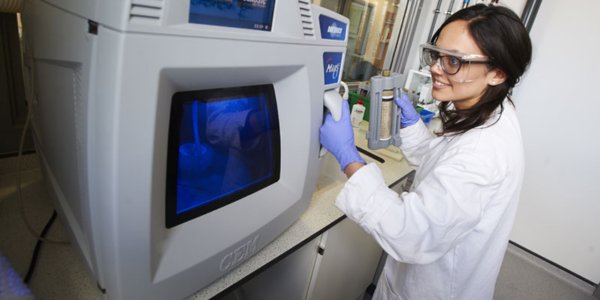University of York Green Chemistry Centre of Excellence to partner in two ambitious centres for doctoral training
Posted on 12 March 2024

The Centres are part of the UK’s biggest-ever investment in engineering and physical sciences doctoral skills - totalling more than £1b - announced today by Science, Innovation and Technology Secretary Michelle Donelan and funded by the Engineering and Physical Sciences Research Council (EPSRC), part of UK Research and Innovation.
The Chemical Synthesis for a Healthy Planet (CSHP) CDT, in partnership with the University of Oxford, will train a generation of sustainability-driven synthetic chemists to address global challenges in energy and materials, human health and food security. The Centre will be led at Oxford by Professors Mike Willis, Ed Anderson and Veronique Gouverneur and at York by Professor Helen Sneddon.
The Process Industries: Net Zero (PINZ) CDT, in collaboration with Newcastle University, will explore how the process industries can significantly improve efficiency and environmental impact, focusing on how they manage energy, materials and data flows. The CDT will train a unique cohort of process intensification and green chemistry experts with the skills needed to be the architects of the UK process industries’ net zero transition. The Centre will be led at Newcastle by Professor Adam Harvey and at York by Professor Helen Sneddon.
Professor Sneddon, Director of the Green Chemistry Centre of Excellence (GCCE), said: "I'm delighted that we are able to bring York's strengths in green chemistry to these two key partnerships. We see great potential synergies in working with the Process Intensification Group at Newcastle and the Department of Chemistry in Oxford and we’re excited to increase our impact through these connections.”
Students at both Centres will receive cutting edge training in the skills necessary to deliver the chemical industry of the future before embarking on industry co-supervised projects to develop innovative, sustainable chemical strategies solving real world problems.
“Both Centres offer an opportunity for talented researchers to translate fundamental research into real world applications through our industry partners,” added Professor Sneddon. “The multiple cohorts of CDT students will have the opportunity to learn from each other as well as their academic and industry supervisors."
Professor Caroline Dessent, Head of the Department of Chemistry, said: “Green chemistry provides an essential framework for ensuring that our chemical industries achieve global sustainability into the future. The world needs many more experts in this field and we’re hugely excited to be part of new CDTs that will help to tackle this.
“York Chemistry provides an exceptional combination of talented researchers and first-class research facilities that will support the new CDTs. We’re delighted to be training the next generation of green chemistry experts in our research community.”
Notes to editors:
- Apply for PINZ CDT doctoral studentships
- Applications for CSHP CDT doctoral studentships are expected to open in September 2024 for the October 2025 intake
